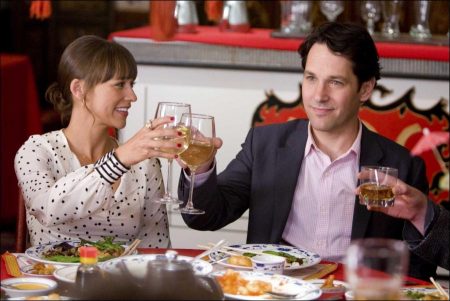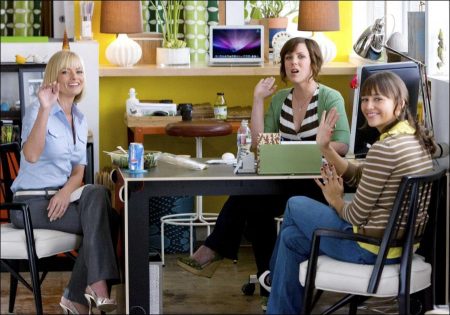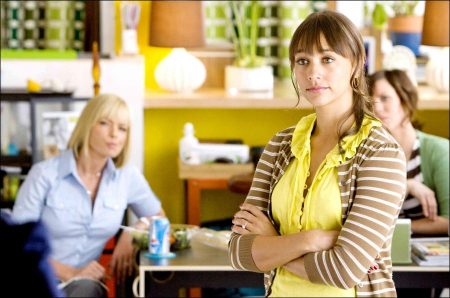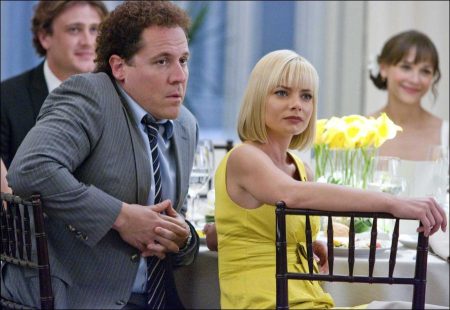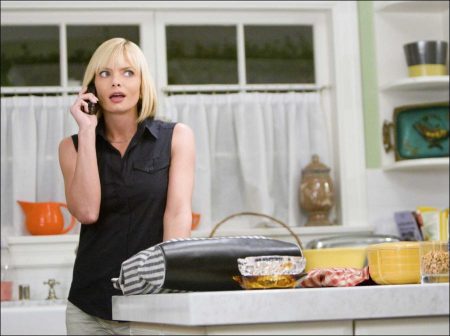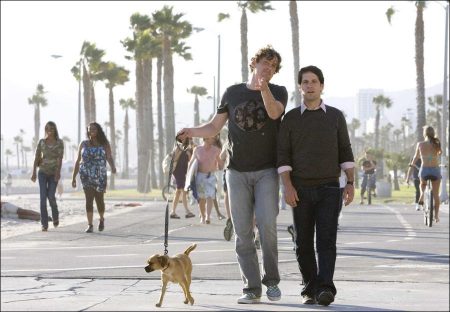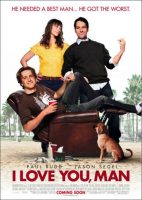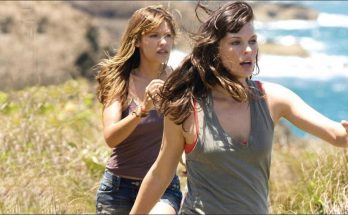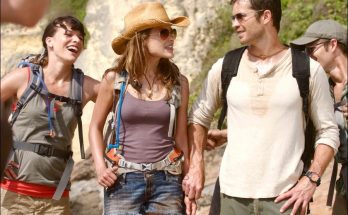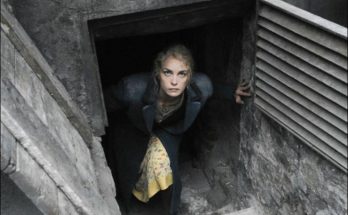Tagline: He needed a best man… He got the worst.
In I Love You, Man, the comedy from writer / director John Hamburg (“Along Came Polly,” co-writer of “Meet the Parents,” “Zoolander”), Peter Klaven (Paul Rudd) is a successful real estate agent who, upon getting engaged to the woman of his dreams, Zooey, (Rashida Jones), discovers to his dismay that he has no male friend close enough to serve as his Best Man.
Peter immediately embarks on a series of bizarre and awkward “man-dates” to find such a friend, before meeting Sydney Fife (Jason Segel), a fun-loving, charismatic man – just Peter’s opposite – with whom he instantly bonds. But the closer the two men get, the more Peter’s relationship with Zooey suffers, ultimately forcing him to choose between his fiancée and his newfound “bro,” in a story that comically explores what’s at the core of male friendship and what it truly means to be a friend.
I Love You, Man (originally titled Let’s Be Friends) is a 2009 American romantic comedy film directed by John Hamburg and written by Hamburg, based on a script previously by Larry Levin. The film stars Paul Rudd as a friendless man looking for a best man for his upcoming wedding. However, his new friend (Jason Segel) is straining his relationship with his bride.
The film was released theatrically in North America on March 20, 2009, to mostly positive reviews.[3] It opened second at the box office next to Knowing, and was a modest hit, grossing $91 million on a $40 million budget. This movie marks the third collaboration between Jason Segel and Paul Rudd, who had worked together on Knocked Up and Forgetting Sarah Marshall previously.
“I Love You, Man”: Origins
Romantic comedies often share the same basic construct: boy meets girl, boy gets girl, boy loses girl, boy gets girl back. John Hamburg’s “I Love You, Man” turns that classic approach on its head – it’s a “bromantic” comedy that takes a look at friendship between two guys – in this case, two men who are complete opposites.
After proposing to his girlfriend, Zooey Rice (Rashida Jones), Peter Klaven (Paul Rudd), a successful young L.A. real estate agent, realizes that, unlike his fiancée, who immediately calls her closest friends to share the news, he has no close buds – in fact, he has no male friends at all. After years of being a “girlfriend guy” focused on romantic relationships, Peter learns that his lack of male friendship worries Zooey, so he embarks on a hurried quest to make a male friend who can serve as Best Man at his wedding.
Under the guidance of his brother, Robbie (Andy Samberg), a personal trainer who is gay and seems to know a thing or two about guys, Peter embarks on a series of disastrous “man-dates” and, quite by accident, crosses paths with Sydney Fife (Jason Segel), a charismatic bachelor who cruises open-houses for free food and lonely divorcées. Peter is intrigued with Sydney, and the two men embark on a friendship that teaches Peter something he’s never experienced, the true meaning of male bonding, but also threatens his relationship with Zooey, forcing him to make some difficult choices.
About the Production
“I Love You, Man” began its life as a pitch by Larry Levin (“Dr. Dolittle”) entitled “Let’s Make Friends,” which grabbed the immediate attention of producer Donald De Line. “It had a basic, classic romantic comedy structure, but with a twist – it was about how a man in his 30s finds a new best friend. There hadn’t been a movie about male friendship or a comedy that explored men’s problems with intimacy. So I said `Done.’”
The project soon came to the attention of John Hamburg (“Meet the Parents,” “Along Came Polly”), who was busy juggling numerous projects, both as writer and director. “Every so often, we would talk on the phone, and John would say, `What’s going on with `Let’s Make Friends?’ I’d say, `It’s here – c’mon, jump in,’ and then he’d go off and do something else,” De Line recalls.
But the producer continued his quest to bring Hamburg aboard, knowing he was perfectly suited for the project. “John’s a brilliant comedy writer and director. Everything he writes is imbued with a certain intelligence and sophistication. He knows how to make movies that translate on a level that appeals to everyone and he’s always able to tap into something we can all relate to.”
Executive producer Andrew Haas concurs. “’I Love You, Man’ was the perfect match for John’s sensibilities because he has such a firm understanding of the human experience. He knows how people relate to each other, but he’s also an incredibly funny guy, so he’s always able to infuse a sense of realistic humor into his work.”
De Line was confident that once Hamburg committed he’d be able to marry his organic, naturalistic style of comedy with a knack for fashioning audience-friendly characters. “What John brings to this project is character detail and an emotional truth that’s at the core of everything he’s done, no matter how absurd or `out there’ the premise may at first appear. With John, you comfortably slip into the main character’s shoes and recognize feelings and situations that you yourself may have experienced. That kind of approach to comedy is what sets John apart.”
So, more than five years after first reading “Let’s Make Friends,” Hamburg found himself thinking again about the premise laid out in that script, and soon came up with his own take on the story of a man without any close male friends, who goes on a quest to find a Best Man before his wedding, calling his version of the screenplay, “I Love You, Man.”
He and De Line then brought the project to Dreamworks. “It was a theme that spoke to me that I thought I could have fun with, that I could lend some comic insight to,”
“I Love You, Man”: The Cast
For the pivotal role of Peter Klaven, Hamburg immediately thought of his longtime friend, actor Paul Rudd. “There’s a kind of open-mindedness to this character that I like,” Rudd says. “He has a positive attitude, but is often ill-equipped to handle many situations in the optimal way. He’s well meaning, and often wears his heart on his sleeve, but there’s something bumbling about him. I relate to Peter, in many ways. John and I keep making jokes that the character is a lot like each of us. For instance, I personally TiVo `Antiques Roadshow.’ I guarantee that the character I’m playing does too. Unless, of course, his TiVo is filled up with too many (Project) `Runways.’”
Rudd has always been a big fan of Hamburg’s writing style, he says. “I’ve known John for years and read many things he’s written. All his male characters are similar to him in many ways, and I connect with all of them for the same reason. He’s really subtle about writing situations in a very funny but completely guileless way. He truly understands what’s funny about the banal.”
Among his favorite scenes in “I Love You, Man,” he continues, are the ones that illustrate Peter’s awkwardness around other men as he struggles to fit in. “John’s a big fan of uncomfortable pauses and jokes that kind of fall flat. So am I.”
Peter also has a penchant for coming up with what he thinks are cool nicknames that leave everyone scratching their heads. “His phraseology is also a little behind the times – he comes up with strange things that sound like they came out of the mouth of a 14-year-old,” laughs Rudd. “I mean, you don’t meet a lot of guys in their 30s who say things like `Totes Magotes,’ but there’s something very funny about being earnest and saying those things. It’s so wonderfully dumb.”
Adds producer De Line, “Peter is such a relatable character and Paul brings out an appealing vulnerability that we all share but don’t always show. He really walks that fine line and perfectly nails it.”
While holding an open house, Peter chances upon Sydney Fife, a fellow mostly interested in the free noshes who has absolutely no interest in buying a house – and candidly admits it. After his string of unsuccessful – and hilarious – “man-dates,” Sydney is like a breath of fresh air for Peter. He is a bohemian at heart with a casual outlook on life. He lives in a bungalow in Venice and spends his time hanging out with friends, sleeping with various single women and walking his Puggle dog Anwar Sadat (so named for his apparent likeness to the late Egyptian president). A seemingly successful private investor who somehow manages to have all the time in the world for a good hang, Sydney only dates divorcées because of their lack of interest in a committed relationship (and their pent-up sex drive). Unlike Peter, he has a tight group of male friends who provide him with male-on-male emotional intimacy. “Male relationships are the rock of Sydney’s life,” comments Hamburg.
To flesh out the enigmatic and charismatic Sydney Fife, Hamburg was certain actor Jason Segel would be Rudd’s ideal sparring partner. Hamburg and Segel had worked together several years earlier on Judd Apatow’s television series “Undeclared” and Segel has since carved himself a comic niche in films with such hits as “Forgetting Sarah Marshall.”
“I got a call from John, saying that he had this great script and that Paul Rudd was playing one of the leads and he wanted me for the other part,” Segel recalls. “I never get calls like that.”
Segel appreciated the script’s naturalistic comedy tone and immediately took to the character. “It’s my favorite style of comedy, which is reality-based and not very broad or schtick-y. There are no hacky jokes so, as an actor, you get to bring some naturalism to the comedy.”
The chance to work with Rudd again helped seal the deal. “I love acting opposite Paul. We were in `Knocked Up’ and `Forgetting Sarah Marshall’ together. There’s nothing better than having somebody you can play verbal ping pong with on a comedic level and Paul is the quickest guy around. I know that anytime there’s the slightest lapse, Paul will swoop in with a great joke.”
Rudd returns the compliment. “Jason is really funny. I think we both really understood these characters and wanted to veer off into some unexplored territory while shooting a scene. Jason has a real affinity for working way, as do I.”
The two are clearly friends – both on and off set, so they already shared the kind of chemistry needed to create a convincing on-screen bond. “It’s extremely powerful when the two of them are on the set together,” notes co-star Jaime Pressly, “because they really do enjoy each other’s company and respect each other, and that comes through on camera. They’re hilarious.”
Adds Segel, “In addition to being the quickest guy I’ve worked with, Paul is also one of the nicest. I’m heterosexual through and through, but I gotta tell you, that guy is dreamy.”
At the core of Sydney’s personality is his warm honesty, coupled with an animalistic charm. “He’s kind of a mix between a golden retriever and an insane person,” explains Rudd. “He will absolutely wear his heart on his sleeve and be very, very sensitive and mushy and flop around like a big dog, and he will also loyally defend a friend to the end.”
Adds co-star Rashida Jones, “Sydney is almost blatant, and Jason’s good like that, because he can also be candid – but in a good way.”
“Jason adds levels of floppy doggedness to Sydney, as well as a dim shade of creepiness, like someone who holds your gaze just a bit too long,” laughs Rudd. “He walks the line of creating a character you believe could either shower you with gifts or kill you in your sleep. He can actually be both simultaneously. It’s fascinating.”
The differences in Peter and Sydney’s personalities are truly what make the relationship work, Segel explains. “Peter has never had a dude like Sydney in his life. Being exposed to a part of his life that he’s lost sight of or given up on, is what draws Peter to Sydney.”
Says Hamburg, “Even though they’re very different, they have a shared sense of humor and a basic sensibility, though they’re not aware of it at first.”
Again, those differences are apparent in the actors’ off-screen personalities as well. “Paul and Jason balance each other out well in terms of style and timing,” says producer De Line. “Visually their physical appearance also contributes to the comedy. Paul is kind of clean cut, all-American, while Jason’s a bit left of center, somewhat bohemian and a little rock `n roll. In every way, their energies complement one another. Their differences are perfectly suited to their characters.”
As the story progresses, Peter and Sydney learn from each other as well. “Sydney teaches Paul that you can talk about certain feelings you didn’t even know you had inside you,” explains Hamburg. “Peter is someone who keeps things inside. Maybe he’s stressed about his wedding or about his relationship, and needs an outlet to express those kinds of things. But Peter really hasn’t had that kind of friend before and he finds it in Sydney.”
CityplaceSydney also benefits from knowing Peter. “Sydney has some pretty crackpot theories and refuses to admit where he’s at in his life,” says Rudd. “Some of the things that are absent from Sydney’s world come into focus when he gets to know Peter, such as being able to be friends with your significant other – even if it is a woman.”
Rashida Jones, who plays Peter’s fiancée Zooey Rice, was enthusiastic about playing a role that went far beyond the typical comedy girlfriend. “Zooey is a completely developed human being, who’s an active participant in the film,” Jones says. “That kind of part is hard to find. She’s not just someone’s girlfriend or wife; she’s a multi-dimensional, fully realized character.”
One of the film’s more grounded characters, Zooey is an intelligent confident woman who fully supports Peter’s friendship quest. StateplaceHamburg sensed that Jones had both the comedic chops and affability for the role. “It was important to me that Zooey not just be the girlfriend and react to the funny guys around her but that she be able to bring the role her own style of humor and point of view,” he explains. “Rashida is very smart, and when you’re working with people like Paul and Jason who are really quick, you need someone who can be at that same level. She’s right up there with them.”
“There’s an innate likeability to Rashida, and it shines through on screen. Plus, she’s beautiful,” says Rudd. “She has the ability to ground something in reality and still be really funny. We really lucked out that she agreed to be in the movie.”
Peter and Zooey share interests that others around them, particularly Sydney, find hard to understand. “You’ll see us sitting around looking through architecture or interior magazines that we, as a couple, really enjoy,” explains Rudd. “We’re not caricatures by any means, but she and I really click in a way that might annoy other people. For example, we’d animatedly discuss, in detail, what’s great about the latest issue of Domino for 45 minutes at a dinner party – and then spend another hour on Real Simple during dessert.”
As for Zooey’s relationship with Sydney, Jones says, “She doesn’t quite know what to make of him. But she still wants Peter to have a friend, so she tries really hard.”
And in doing so, she observes something in Peter and Sydney that most women rarely get to see. “Zooey represents the perspective of women watching how men become friends. It’s like watching some kind of anthropological experiment.”
As for her own social life, Zooey is a completely grounded woman with loads of women friends, and two very close ones, Denise (Jaime Pressly) and Hailey (Sarah Burns). The three women are completely unalike, though, as Jones explains, “Denise and Hailey really represent opposite sides of Zooey. Denise is incredibly opinionated and strong-willed, while Hailey is more wishy-washy.”
Burns is more explicit in her description of Hailey. “She’s been single for a long time and she’s miserable about it,” she says. “She works really hard at getting a boyfriend and shoots herself in the foot every time she tries. Let’s just say she comes on a little strong.”
The three women own a furniture/home design store together and seem to know everything about each other. “Women are quick to be vulnerable with each other,” Jones explains. “They do it in either of two ways. It’s either negative bonding, which is kind of foul, or it’s like immediately you get to the heart of your relationships and what you want in life. For guys, it’s a little tougher to get them to come out of their shell.”
Unlike men, Pressly adds, women tend to leave no detail unexposed, particularly when it comes to sex. “Women are actually worse that way because we get together and talk about everything under the sun, and in more graphic terms than men. I think when men get together, they don’t really give away as much because there’s more of an ego there; they want to be a little more cool.”
Burns agrees, adding, “Women talk much more about sex and their bodies and things that go wrong with their bodies. When guys talk about sex, it’s kind of creepy and disgusting; when women do it, it’s like a bonding experience.”
While in the traditional romantic comedy the person looking for love usually seeks advice from a best friend, in “I Love You, Man” Peter turns to his brother Robbie, played by `SNL’s’ Andy Samberg, to help guide him through the process of finding the right guy. Robbie is much more the traditional macho male, and thus a perfect candidate to be doling out advice on how to meet men. He is also gay. Robbie is a personal trainer and nothing short of an expert on what it takes to attract a man and what other men find attractive.
Although Robbie’s sexual orientation is a big part of who he is, it doesn’t define him or influence his outlook on traditional masculinity. “This character isn’t defined by the fact that he’s gay,” says Hamburg. “In fact, it’s almost inconsequential. And Andy knew how to play that. He didn’t try to make everything funny, he just played the reality of the character and the comedy that lies within that.”
Adds De Line, “Ironically, Robbie is straighter in many ways than Peter is. He’s the guy who watches sports with his dad. He also has all kinds of guy friends, while Peter is more of a metrosexual kind of guy.”
Peter comes from a very tight-knit family, but his relationship with his father, Oz, has never been as close as Robbie’s. Oz and Robbie are best friends, enjoying the traditional father-son activities. Oz also fully supports and involves himself in Robbie’s sexual orientation.
“Oswald Klaven is a man’s man, as is his son Robbie,” says J.K. Simmons, who plays “Oz.” “My other son, Peter, is just not so much a guy’s guy; he’s more of a girlfriend guy.”
“Oz is kind of a `Great Santini’ type of father so you wouldn’t expect him to accept his youngest son’s gayness, but he does, without reservation,” explains Hamburg. “He loves both his sons but is just better friends with the gay one because they bond over the same things, like playing video games, going fishing and hanging out. It’s just the kind of guys they are.”
“For the roles of Oswald and Joyce Klaven, the filmmakers were enthused to have Simmons and Jane Curtin in the roles. “We were so lucky to have gotten both J.K. and Jane,” says Hamburg. “They feel like a real couple because they’re understated and yet really sharp and funny. It was amazing because if you asked them to ad lib they were terrific at it while always remaining in character.”
“I was really excited when I heard that the role of my father was being played by J.K., because he’s one of those actors who is equally believable in a really sweet role like the dad in `Juno’ or a terrifying con in (the HBO prison series) `Oz,’” comments Rudd. “And when I heard about Jane I thought, `Oh my god, she’s an icon.’”
Observes Simmons, “John’s writing style is unique. We think we’ve seen this sort of raunchy comedy before, but he’s got his own voice within that that’s very, very funny.”
On his journey to find a best friend, Peter attends a few male-oriented social activities and embarks on various “man-dates” with the help of family, friends and the Internet. In an attempt to bond with the husband of one of Zooey’s girlfriends, Peter takes part in “poker night” at Denise’s house, joining her husband, Barry, and his friends – much to Barry’s displeasure.
For the role of Barry, Hamburg was able to snag a much-sought-after actor, who is also currently one of Hollywood’s top directors. Two weekends after the release of his mega-hit “Iron Man,” Jon Favreau was ready for some rest. “Normally, when a movie like that comes out, your life gets very busy, and all you want is a little down time,” he notes.
But Hamburg had other plans. “When we cast Jaime Pressly as Denise, we felt like we needed somebody to play her husband who could give it right back to her, so we immediately pursued Jon,” Hamburg says.“Fortunately, he wanted to do the movie.”
“I was talking to (`Iron Man’ star) Robert Downey Jr., and he said, `It’s the best thing you could possibly do,” notes Favreau. “Just go there and be a great actor and just dial into that, so you can find a little bit of balance.’”
“Jon was a joy,” recalls Hamburg. “It’s funny, because here you have this big, successful director and he’s just `Whatever you need, I’m here for you.’ He was right there ready to be a pro and do whatever it took to get his scenes done.”
Favreau describes Barry quite simply as “an asshole.” Barry has no interest in spending time with Peter, whom he regards as a dork with no idea how to play poker. He agrees only because his equally brash wife agrees to have sex with him with the lights on. “I’m playing him as an insensitive prick, with absolutely no empathy towards the guy – and it’s always fun to play a person who’s unapologetically who they are.”
Barry and Denise’s relationship quickly jumps from hot to cold in the blink of an eye. “They like to fight and then make up,” says Pressly. “That’s their favorite thing to do.” Explains Favreau, “Their relationship is particularly contentious. She’s a bit acerbic, clearly not a happy person, nor is my character. They’re sort of both settling for a lack of happiness. But there’s a kind of bond there too, a love that is true and they depend on one another.”
As a real estate agent in Los Angeles, Peter has many chances to cross paths with a variety of celebrities, and he’s excited about the opportunity to elevate his career out of the “flats” of L.A. and into the hills, via landing Lou Ferrigno, TV’s “The Incredible Hulk,” as a client.
“’I Love You, Man’ is an L.A. story, so I figured Peter’s probably going to find himself selling some celebrity houses because he wants to take a step up in his career, and somehow Lou Ferrigno popped into my brain,” recalls Hamburg. “I had no idea whether we would be able to get him, but I wrote it and it seemed to tie in, and it all spiraled from that.”
Ferrigno was excited about the possibility of working on a comedy, an opportunity that doesn’t often present itself to the man twice-crowned Mr. Universe. “John Hamburg brought me into the film and I couldn’t have been happier,” says Ferrigno. “John really knows comedy and he helped bring out the best in me.”
“Lou was excited about doing the film and he was really fun to work with,” the director says. “He’s a real human being, a very sweet man. He also has the biggest hands of any human being I’ve ever met,” he laughs.
“I was so psyched when I heard that Lou said yes,” recalls Rudd. “He’s really funny and very natural. It’s hard not to use the word `Incredible’ when describing him because that’s a bit on the nose, so I’ll just say that Lou Ferrigno kicks ass.”
With so many talented and funny actors comprising the ensemble cast, keeping a straight face on the set of “I Love You, Man” was sometimes next to impossible. “I’ve done a lot of comedies and have always prided myself on being able to keep my composure, but all that hasn’t worked on this film,” says Rudd. “I couldn’t stop laughing on this movie. I ruined not just takes, but entire reels of film.”
A dinner sequence at Hop Louie Chinese restaurant in L.A.’s Chinatown Hills involving almost the entire cast was a day loaded with shenanigans. “It was kind of like a middle-school cafeteria,” recalls J.K. Simmons. “I kept cracking up and blowing Slippery Shrimp out of my nose during one of Jason’s toasts.”
“That’s what happens in real life,” placeStateHamburg adds. “It was fun but we had many takes ruined by laughter. It was an enjoyable atmosphere. You could tell we were definitely making a comedy.”
“John really let us do our thing,” explains Segel. “His script was so tight and so good that there was no need to deviate from it in any real way, but things just popped out of your mouth. One of the great things about working with John is that he’s very comfortable with the actors trying to make the dialogue their own.”
On set, the actors would do a few takes as scripted, but then either they or Hamburg would begin to explore new opportunities for comedy. “It was so easy, because the characters were so well-developed,” notes Rashida Jones. “John would fight for what he thought was essential in the scene and then let us do whatever felt natural.”
“We’d be sort of improvising as a scene goes along,” says Simmons, “and then you’d hear some schmuck in the peanut gallery throw out a line, and you go, `Oh – that’s Hamburg.’ Then everybody would just regroup and throw in his idea. Then he’d throw out more ideas and people would just pick up the ball and run with it. It was really a lot of fun.”
Adds Favreau, “It made for a nice, free flowing environment that really leant itself to discovering interesting and funny moments that aren’t obvious or hamfisted.”
Even actors who didn’t have any scripted lines in a particular scene could count on getting involved. “Even though you might not have a line, you’re going to, because inevitably you’re going to improv in every scene,” says Jaime Pressly. “We would just laugh all day and have fun and enjoy each other’s company.”
“I Love You, Man”: The Production
“If you see a cool-looking guy, strike up a conversation. Ask him on a man-date. By that, I mean a casual lunch or after-work drink. No dinner and no movies. You’re not taking these boys to see `The Devil Wears Prada,’ understand.” – Robbie (Andy Samberg)
Shot entirely in Los Angeles, “I Love You, Man” shows the city in a way rare for Hollywood films. “Growing up in Manhattan, I always had a fascination with Los Angeles,” explains John Hamburg. “I spent a lot of time in L.A. working, so I think I had a romanticized view of it, which is why I really wanted to set the movie here, to explore what’s underneath.”
As sprawling as the city is, L.A. can sometimes be a hard place to develop one’s “inner circle” – making it the perfect location for this movie’s premise. “When you’re searching for friends and community, Los Angeles has all these pockets but no center and it can feel quite lonely without any friends,” notes Hamburg.
The director also wanted to portray the city as a fun character in his story. “John really wanted the character of the city to come through in a way that you normally wouldn’t see in a comedy,” explains producer De Line. “People have shot really interesting films in placeCityLos Angeles, usually of a more dramatic nature, that show interesting aspects of the city. But a comedic approach to that is a really fresh and groundbreaking thing.”
One aspect Hamburg wanted to incorporate into the story was to show that where you live in the sprawling metropolis can define who you are and make it harder to break out of your mold. “There are many different aspects and parts of L.A.; Peter Klaven lives on the east side, while Sydney lives way out west in Venice, which feels like a beach town,” comments Hamburg. “Even though you’re both living in the same city, if you choose to live in placeCityVenice, you’re probably a different sort of person than someone who chooses to live an hour away from the ocean.”
Observes production designer Andrew Laws, “With placeCityVenice, you don’t quite know what you’re getting. Putting Sydney in Venice adds a lot of texture to who he is.”
While in other films, Venice has often been portrayed as a haven for kooks and drug dealers, Hamburg sought to show another facet of this relaxed and somewhat eccentric enclave. “The extras we used were some of the freakiest of the freakos,” says Jason Segel, “but they were behaving realistically – like they were on the Venice boardwalk on a normal Tuesday afternoon.”
One of Sydney’s favorite daily activities is walking his Puggle (a mix of a Pug and a Beagle) on the Venice boardwalk, where some of the other dog owners – who Sydney calls “bowsers” – also walk their dogs. “A bowser is a term Sydney Fife invented for someone who looks like their dog,” explains co-producer Anders Bard.
The search for such dog/owner combinations was an extensive process. “Our extras casting group put out flyers and about 250 people showed up with their dogs. We had people who arrived dressed like their dogs or with the exact same haircut, which I found really interesting in a weird, creepy sort of way.”
The Venice boardwalk is also where Sydney has a physical altercation with Lou Ferrigno and ends up in a choke hold. “The choke hold is actually very effective,” says Ferrigno. “Done correctly, it can close off the main artery in a person’s neck and decrease the blood supply. It actually knocks you out for a couple of minutes.”
Of course, on film, the move only had to look effective, so a stunt coordinator showed the muscle man how to execute the move on Segel without hurting him. “It was a pleasure to learn, from an expert like that, how to make it both safe and believable because, in real life, it’s a very dangerous hold.”
Since the fight between Ferrigno and Segel was shot on the Venice boardwalk at midday, onlookers and paparazzi crowded the streets to watch. “Shooting that scene was a bit like being Angelina Jolie in Cannes,” explains Rudd. “I’m trying to react to Lou Ferrigno putting my friend Sydney in a sleeper hold and all I can hear are cameras behind me snapping pictures. Weird.”
While he’s apparently got plenty of money, Sydney lives in a modest bungalow near the beach and spends most of his quality time in his “man cave” – a converted garage / fantasy room behind his house where boys can be boys and indulge in all things male. “The man cave is a place for guys to escape, and there’s something very appealing about it,” explains Rudd. “When you’re a kid, you find a bit of an escape in your bedroom, but when you’re older and married, though you may have an office or den, it’s just not the same. When you’re in a man cave, you feel like a 10 year-old boy again.”
“The man cave is the ultimate men’s leisure center,” observes Segel. The room is filled with comfy couches, three TVs, books, CDs, DVDs, a top-notch sound system, and a bevy of musical instruments for impromptu jam sessions.
Laws’ design for the man cave is layered with detail, realistic touches that reflect Sydney’s personality. “He’s got a new TV and an old Sony Trinitron next to each other,” notes Hamburg. “And there’s a wall of photos – a lot of dudes – his wrecking crew.”
Laws notes, “John and I talked about it – it had to have just typical male stuff. Even the books on the shelves are very particular books, maybe not the things you would necessarily expect this guy to be reading. They tell you a little more about who Sydney might be.”
So is the real-life Sydney – Jason Segel – anything like his character? “I live with my best friend from when I was 13 years old, which is pretty awesome,” the actor reveals.
Says Rudd: “Jason’s house, I believe, used to be a club with different levels,” says Rudd.
“I actually think it still is a fully functioning disco,” notes Hamburg, adding, “Some stories of his Saturday nights are better left private.”
Before meeting Sydney, Peter goes on a number of bizarre – and very funny – “man dates” in hopes of meeting a new best friend. “He’s never had a best friend, so he doesn’t know what it feels like,” says Rashida Jones. “So he’s kind of looking in all the wrong places.”
Peter embarks on a “man-date” to an L.A. Galaxy soccer game with Lonnie, a client of Robbie’s who has been promised free personal training sessions in return. Things quickly turn sour when Lonnie, who has an unusually high-pitched voice that grates on even the most patient of people, loudly chants and heckles the players throughout the game. Things go from bad to worse when a fight breaks out between Lonnie (played by comic actor Joe Lo Truglio) and other fans and Peter gets caught in the middle.
To shoot the Galaxy game scene, the filmmakers reserved a small section of the arena at an actual game and shot the entire scene over the span of the game. Shooting within a prescribed period of time surrounded by 30,000 game watchers who were unaware of what was going on proved to be a challenging experience.
“There’s something to be said for the energy a scene gets when you only have a limited amount of time to film it and while the fans are looking at you but not really aware of what is going on,” says Hamburg. “Paul was trying to keep calm while Joe was screaming and sweating and fights were breaking out all around him. It was quite an exhilarating way to shoot amidst all this mayhem – and a great deal of fun besides.”
During visits to Sydney’s man cave, Peter and his friend discover that they have one passion in common: the iconic rock trio Rush. “I was thinking of a band that these two guys might bond over, one not everyone else would be a fan of. And if you love Rush, you really love them,” says the director. “A lot of these stories come from my own experiences. I was a big fan of Rush as a kid and still am. I knew they had a lot of songs that would be really fun to put into the movie.”
The two spend a lot of time playing music together, but things really start to become serious when they attend a Rush concert. The filmmakers were overjoyed when the group agreed to appear in the movie, making their feature film debut. The concert was filmed at Avalon Hollywood (the historic former Palace Theater) on a one-day break from their 2008 tour. “That night was such a surreal experience,” says executive producer Andrew Haas. “It was midway through production, after some long days, and we had a concert hall packed full of Rush fans. I don’t know if you know Rush fans, but the energy was just electric and it gave us the fuel to power on.”
“The members of Rush were really great to work with,” says Hamburg. “It was quite a joyous night of filming and they were really cool and gave us everything we needed.”
“I Love You, Man” treats a real-life situation – the challenge for men to make new friends as adults – with a combination of sensitivity and outlandish humor. “This movie will appeal to everybody,” observes Jason Segel. “It’s got some of the raunchiness that you look for in a dude movie, but also has the sensitivity you look for in a romantic comedy. If you take a girl, she just might say, `You know what, you picked a very sensitive film. That says a lot about you.’ It’s a win-win for everyone.”
“John is so insightful and talented and I felt like we really clicked,” notes Rudd. “I think his ability to capture comedy is really strong, and I know it’ll be funny. It has the potential to be a really engaging story with characters that both men and women will like and relate to.”
‘I Love You, Man’ explores the challenges and difficulties related to forming and maintaining adult relationships, especially male,” says Hamburg. “What we’re trying to do with this movie is bring something up that exists beneath the surface, which is the challenge of making friends as an adult. I think it’s hopefully shining a light on something that exists, and maybe guys will be more open to going to the movies together, sharing a box of popcorn and just hanging out.”
I Love You, Man (2009)
Directed by: John Hamburg
Starring: Paul Rudd, Jason Segel, Jaime Pressly, Rashida Jones, Rob Huebel, Jon Favreau, Sarah Burns, Jane Curtin, Andy Samberg, Kym Whitley, Caroline Farah, Jean Villepique, Liz Cackowski
Screenplay by: John Hamburg
Production Design by: Andrew Laws
Cinematography by: Lawrence Sher
Film Editing by: William Kerr
Costume Design by: Leesa Evans
Set Decoration by: Christopher Carlson
Art Direction by: Eric Sundahl
Music by: Theodore Shapiro
MPAA Rating: R pervasive language, including crude, sexual references.
Distributed by: DreamWorks Pictures
Release Date: March 20, 2009
Views: 100
